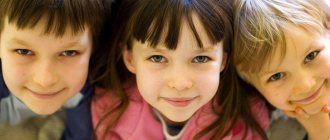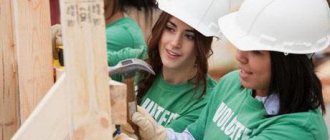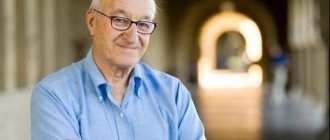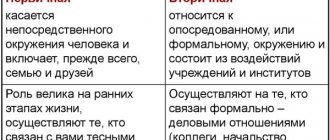Personal development as a pedagogical problem
One of the complex and key problems of pedagogical theory and practice is the problem of personality and its development. Pedagogy studies and identifies the most effective conditions for the harmonious development of the individual in the process of training and education. The main components of development are social, cultural, intellectual, physical and professional development, the development of abilities (creative, organizational, managerial, pedagogical, etc.), corresponding cognitive, business, volitional, physical and professional qualities. An integral indicator of development is personality development. Development and sophistication is the process and result of the degree to which a person realizes his capabilities.
The main functions of the individual are the creative development of social experience and the inclusion of a person in the system of social relations. Personality exists, manifests itself and is formed in activity and communication.
In modern conditions, it is difficult to imagine introducing a person to life without specially organized training and education. It is education that acts as the most important means by which the social program for the development of the individual, his inclinations and abilities is implemented. Thus, along with the environment and biological inclinations, education acts as the third significant factor in the development and formation of personality.
Modern domestic pedagogy stands on the point of view of the dialectical relationship between learning and personal development: without learning there can be no full development of the individual. Learning as an activity takes place where a person’s actions are controlled by the conscious goal of acquiring certain knowledge, skills, and abilities. The main result of educational activity in the proper sense of the word is the formation of theoretical consciousness and thinking in the student. The nature of all knowledge acquired during further training depends on the formation of theoretical thinking. The activity of teaching is self-change, self-development of the subject, transforming him from one who does not possess certain knowledge, abilities, skills into one who owns them. The psychological content, the subject of educational activity, is the assimilation of knowledge, mastery of generalized methods of action, in the process of which the student himself develops.
2 pages, 618 words
Factors of human speech development
... An important condition for the timely and correct development of children’s speech development is a preserved psychological base. The human body is a complex interconnected system, therefore, mental processes... perceive the speech of others, imitate it and control its pronunciation. The overall picture of the development of speech skills in a child can change significantly with a pronounced decrease in...
The product of educational activity is internal new formations of the psyche and activity in motivational, value and semantic terms, the formation of knowledge and the ability to apply them to solve a variety of practical problems.
The external structure of educational activities consists of the following elements:
1) motivation;
2) educational tasks in certain situations in various forms of tasks;
3) educational activities;
4) control turning into self-control;
5) assessment, turning into self-esteem.
As learning tasks are completed, the student himself changes. A learning task acts as a system of information about some object, in which only part of the information is clearly defined, and the rest is unknown. It needs to be found using existing knowledge and solution algorithms in combination with independent guesses and searches for optimal solutions.
Educational activity as a whole includes a number of specific actions and operations at different levels: executive educational actions and control actions. Along with mental ones, educational actions include perceptual and mnemonic actions and operations, reproductive (performing, patterned) and productive (aimed at creating something new) actions.
Socialization
This is exactly what happens in a team. Formation is a definition in pedagogy, the meaning of which has been given a lot of attention. What can you say about creating a student team? This process is extremely important because it is in this society that children will grow as individuals and learn.
In a good team, the ethical education program is implemented in full. Children form opinions about the norms of interpersonal relationships, they learn forms of expressing requests, greetings and addresses, learn correct behavior and competent speech. In the future, they develop the ability to interact with other people. They adapt to them, try out the acquired communication skills and qualities. Children also begin to sympathize and empathize with people, animals, plants, and often even try to look for ways to cooperate with their parents.
Education and personality formation
Education as a phenomenon of pedagogical reality is an object of research in pedagogical science along with training and education. From a social point of view, education is the purposeful preparation of the young generation for life in a given and future society, carried out through specially created state and public structures, controlled and adjusted by society.
The modern educational process should be based on the following progressive ideas:
1. Personality in the modern humanistic paradigm of education is considered as the highest value.
2. The purpose of education is the versatile harmonious development of a self-actualizing personality in conditions of collective creative activity.
3. The essence of education is the development of the pupil’s relationship with the surrounding world (homeland, society, people, living and inanimate nature, material and spiritual values, with himself), i.e. in the formation of his life position, determining his place in the system of value relationships.
4. The content of education is to ensure the pupil an active position in the educational activities organized by the teacher.
5. The entire education system (training and upbringing) is focused on a personal approach.
6. In the modern understanding of education, the idea of pedagogical support acquires special significance.
7. Productive teaching and upbringing are built in the mode of dialogue between teacher and student.
8. The purpose and position of the educator, according to E.N. Ilyin, are expressed in five defining verbs - love, understand, accept, sympathize, help.
6 pages, 2873 words
Some aspects of personality education in a single-parent family (based on materials...
... The article reflects the results of studies of single-parent families and the influence of upbringing in a single-parent family on personality, conducted by psychologists, sociologists, demographers of Russian and Latin American scientific ... families. Key words: family transformation, single-parent family, single-parent family, divorce, education. Raising children in a society moving from a child-centered family model to a married one...
The educational process is a purposefully organized process of interaction aimed at meeting the needs of its participants. The culture of society is the source of the principles of education; it determines its nature, goals and content. Another factor in education is the culture of each individual with whom the student interacts. The culture of society, of each participant in the educational process, creates that rich socio-cultural environment that nourishes the developing personality and creates conditions for its self-realization.
The most important condition for education is a person’s ability to self-development. Self-development is determined by the needs and motives of the individual. Therefore, the most important task in organizing the educational process is to ensure positive motivation for students in overcoming gradually increasing difficulties in the course of self-development and self-realization.
Education as a pedagogical activity is built on appropriate patterns and methodological principles and sets an adequate goal.
The most important general principles of education:
– education is determined by the culture of society;
– education and training are two interdependent processes with the decisive role of education;
– the effectiveness of education is determined by the activity of a person, his involvement in self-education;
– the effectiveness and efficiency of education depend on the purpose, content, forms, methods, means adequate for the pupil and teacher;
– the effectiveness of education is determined by taking into account the needs, interests and capabilities of the individual, treating him as an integrity and self;
– the results of education depend on understanding and taking into account the influence of objective and subjective factors on the personality.
The priority principles of education in modern conditions are: the principle of science, the principle of conformity with nature, the principle of cultural conformity, the principle of non-violence and tolerance, the principle of the connection between education and life, the principle of aestheticization of children's (youth) life, etc.
The most targeted and effective education is carried out during the educational or pedagogical process. The goal of the educational process is to orient students toward self-education, self-development, and self-realization.
The upbringing of a person is determined not by individual qualities, but by their totality, moral content and orientation, and level of development. Well-organized education leads to the formation of a person’s ability to self-education, when he is freed from the influence of those around him who educate him and turns his “I” into an object of his own perception and independently thought-out influence on himself for the purpose of self-development.
Self-education is a human activity aimed at changing one’s personality in accordance with consciously set goals, established ideals and beliefs. Methods of self-education include: self-knowledge, self-control, self-stimulation. Self-analysis, self-esteem, self-control, self-regulation, self-persuasion are the main techniques of self-education.
15 pages, 7025 words
Social work with children from disadvantaged families
... called “social risk families” acquire the status of disadvantaged families, becoming the main objects of social work. The reluctance or inability of the family to perform its functions causes enormous damage to society. Crime, vagrancy, drug addiction and alcoholism among children and...
The traditional areas of educational work are: mental, physical, labor, moral and aesthetic. Currently, new directions are being formed - civil, legal, environmental, economic. Among the many classifications of education methods, three main groups are distinguished:
– beliefs;
– stimulating;
– organization of life and activities.
The purpose of persuasion is to create, strengthen or change the views, opinions, assessments, and attitudes of the person being educated. Often the process of persuasion is an overt or hidden discussion between two or more people. Usually there are four main groups of persuasion methods: informational, search, discussion, mutual education.
Stimulating methods include approval and condemnation, reward and punishment.
The purpose of methods of organizing life and activity is to teach certain skills, abilities and forms of behavior from the simplest actions to conscious social acts. Methods of organizing life and activity include: pedagogical requirement, training, exercise, creating educational situations, example. The means of education include everything that a person uses in the process of moving towards a goal: objects and values of material culture, natural phenomena, achievements of science and technology, nature, etc.
The process of development and formation of personality
A person is born as an individual, as a subject of society, with his inherent natural inclinations, and is formed as a personality in the system of social relations thanks to purposeful upbringing
Personality is a person, a social individual, combining the features of the universal, socially significant and individually unique
This concept expresses a person’s belonging to a certain society, a certain historical era, culture, traditions; a person reveals himself only in social relations
Unique traits and characteristics characteristic of a person express her individuality
Individuality is a holistic characteristic of an individual person, its originality, originality of mental makeup
Not every individual is an individual. To do this, he needs to become a person. This occurs in the process of personality development - its formation and formation under the influence of external and internal, controllable and uncontrollable factors, among which the leading role is played by targeted education and training. Human development cannot be reduced only to the assimilation, simple accumulation of knowledge, skills and knowledge from various fields of science and practical activity. It consists primarily in qualitative changes in mental activity, in transitions from its lower stages to higher ones, in the emergence of new possibilities of memory, perception, ideas, thinking, will, character, etc., in the formation of new personality qualities. All these. Mental processes are a necessary condition for the formation of personality - the formation of a person as a social being due to the influence of the environment and education on the internal forces of development.
The concepts of “human development” and “personality formation” are very close, they are often used as synonyms; in fact, the concept of “personality”, in contrast to the concept of “person”, means the social characteristics of a person, that is, its qualities that are formed under the influence of communication and relationships with other people, society as a whole. However, human development and the formation of his personality is a holistic process. In it, a person’s activity plays a large role; it can significantly contribute to the formation of one’s own personality, if the teacher sets appropriate goals for it and it strives to achieve them, developing the qualities necessary to achieve them, depending on the driving forces, these types of development and formation are distinguished personality: spontaneous, purposeful, self-development and self-formation, self-development and self-formation.
The human personality develops in anatomical, physiological, mental, and social directions. Anatomical and physiological changes are manifested in the increase and development of skeletal and muscular systems, internal organs. An, nervous system. Mental changes cover mental development, the formation of mental personality traits. Social development in socialism consists in the acquisition of social qualities necessary for life in society.
Personal development depends on heredity, environment and upbringing. Its source and internal content are various internal and external contradictions. They manifest themselves in the mental processes of elevation and inhibition, in the emotional sphere - in sensations of pleasure and displeasure, joy and grief. These contradictions also relate to hereditary data and the needs of upbringing (a disabled child, thanks to upbringing, reaches a certain level of development), the level of personal development and the ideal (since the ideal is always more perfect than a particular pupil, it encourages personal self-improvement). They stimulate the development of a balance between the needs of the individual and moral duty (so that the need does not go beyond the limits of social norms, it is “restrained” by a person’s moral duty, contributing to the formation of healthy material and spiritual needs of the individual). The personality is actively developing, experiencing contradictions between its aspirations and capabilities (trying to achieve certain results in learning with an insufficient level of cognitive capabilities, the child begins to work hard on himself).
In teaching and educational activities, teachers should take into account that the development of a schoolchild’s personality has an imitative nature (this pattern is the basis of the theoretical foundations of the use of example in education), and the human personality develops in activity (the comprehensive development of a person’s natural inclinations occurs only in the process of his life activity), under the influence of the environment (living conditions, especially the immediate environment, the media, the street, the school community, have a tangible impact on the development of the student’s personality). This development occurs as a result of the influence on all aspects of the human psyche (in a lesson, educational session, thinking, attention, memory, imagination, and the emotional and sensory sphere should be involved). New personality traits require a new attitude towards it (taking into account in education not only the age characteristics of students, but also its daily enrichment with knowledge and life experience), because every next day it is different from yesterday’s lesson.
Features of physiological and mental development are associated with the anatomical and physiological maturation of the body (its organs, central nervous system, endocrine glands). The entire development process in humans is divided into certain age periods.
Age periodization (classification) - division of the entire human life cycle into age segments (periods), measured in years
For the first time, a unique age-based periodization of personality was proposed by an ancient Greek philosopher. Plato (428-348 BC). Covering the life cycle of human development from birth to death, it reveals the content of the behavior and activities of the individual in each age period.
Age periodization of the Czech teacher. Yana. Amos. Comenius (1592-1670) provides for childhood, adolescence, youth, manhood and corresponding degrees in the public education system, each of which is designed for six. Rocky.
Over time, an empirical classification related to the development of schools and preschool institutions has become established in school practice. In pedagogy, school age is divided into junior (6-7 - 11-12 years), middle, or tkakov (12 - 15 years), senior, or youth (15-18 years). The boundaries of age periods are relatively flexible, because the natural potential of children and the educational influence on them are different. Each age group is characterized by certain anatomical, physiological, mental and social characteristics, which are called age-related characteristics.
Features of family education
The initial structural unit of society, which lays the foundations of the individual, is the family, uniting spouses, children and parents. The marriage of two people is not yet a family; it appears with the birth of children. It is in the family that the foundations of a person’s morality are laid, norms of behavior are formed, and the inner world and individual qualities of a person are revealed.
Scientists identify various functions of the family. We will focus on those that relate, first of all, to the upbringing and development of a child.
Reproductive function is determined by the need to continue the human race.
The economic and household function is related to issues of accumulation of property, acquisition of property, privatization of housing, inheritance, etc.
The function of primary socialization is to gradually introduce the child into society so that his development proceeds in accordance with human nature and the culture of the country where he was born.
The educational function is associated with the process of primary socialization. At a young age, the child’s direct experience acquired in the family sometimes becomes the only criterion for the child’s attitude towards the world around him and people.
The recreational and psychotherapeutic function lies in the fact that the family becomes a niche where a person can feel absolutely protected, be absolutely accepted, despite his status, appearance, life successes, financial situation, etc.
In pedagogy, there is a classification of families not only by composition, but also by the nature of the relationships in them. Depending on the structure of kinship ties, the following types of families are distinguished: simple family (married couple with children), extended or complex family (includes three or more generations living together), two-parent family (the presence of both spouses), single-parent family (one spouse absent).
7 pages, 3216 words
A type of improper upbringing in the family based on a lack of...
... in a crowd; B) an occasional crowd; d) an expressive crowd. . The type of improper upbringing in the family, based on a lack of control and guardianship, lack of true interest in the child’s affairs, worries... and hobbies, is called: a) Hidden hypoprotection, b) hypoprotection, c) indulgent...
Based on the nature of relationships, families are divided into ideal, average, negative or scandalously irritable. Based on the stability of family relationships, families are classified into harmonious, disintegrating, and disintegrated families; according to the level of well-being – prosperous, pseudo-prosperous, disadvantaged.
The goal of family education is the formation of such personality qualities that will help to adequately overcome the difficulties and obstacles encountered on the path of life. There are two opposing styles of family education - authoritarian and democratic.
With an authoritarian style, adults take little account of the child’s individuality, his age characteristics, interests and desires. As a result, children develop little independence, initiative, and creativity.
In a democratic style, parents are the organizers of the life of the entire family group. The relationship between husband and wife, as well as other family members, is characterized by love and respect, attention and care for each other.
There are several types of improper upbringing.
Neglect, lack of control - the child is left to his own devices and falls under the influence of bad companies.
Overprotection implies vigilant supervision and numerous prohibitions. As a result, the child becomes lacking initiative and unsure of his abilities.
A type of overprotection is education according to the type of “idol” of the family. The child gets used to being the center of attention and constant admiration. As a result, he develops inadequate, inflated self-esteem.
Cinderella-type education takes place in an atmosphere of emotional rejection, indifference, and coldness.
With “hard upbringing,” children are severely punished for the slightest offense, and they grow up in constant fear (fear is the most abundant source of vices).
Education in conditions of increased moral responsibility consists of the following: from an early age, the child is instilled with the idea that he must necessarily justify the ambitious hopes of his parents. As a result, such children develop obsessive fears and constant anxiety for the well-being of themselves and their loved ones.
The level of parents' pedagogical culture significantly influences the success of the family in fulfilling its educational function. Pedagogical culture provides for the most important ability of parents to combine true love with reasonable demands on children.
The family is connected with society, state and public organizations and institutions by thousands of threads. Therefore, constant care of the state and society about the family is necessary. The basis of family education is family law, which is enshrined in the Constitution of the country, legislative and regulatory documents on marriage, family, child rights and the protection of motherhood and childhood. An important place among the documents guaranteeing the life and health of children is occupied by the UN International Convention on the Rights of the Child, adopted in 1989 and ratified by the Supreme Council of the Republic of Belarus in July 1990.
5 pages, 2410 words
The role of the father in the system of social education of children in the family
… family"; - identify social problems of a single-father, single-parent family; - analyze the behavior and roles of the father in family education... In the legal and legal literature in the Republic of Belarus and the Russian Federation, the status of a single father is not... The most important social function of the family has always been and remains the education of the younger generation. The family is called upon to provide the child with the necessary conditions for...
The first step taken in the republic to implement the provisions of the Convention was the adoption on November 19, 1993 of the Law of the Republic of Belarus “Children’s Rights”.
The Presidential Program “Children of Belarus”, approved on January 6, 1998, which has five subprograms, is aimed at protecting the rights of children and ensuring their social protection.
Among the documents defining state policy in the field of protecting the rights and interests of children in the family, one should also mention the Law “Main Directions of State Family Policy of the Republic of Belarus” approved on January 21, 1991. The legal foundations of family education are based on the relevant articles of the Constitution and the Law of the Republic of Belarus “On Education”. To legally resolve various types of situations that arise in the new conditions of society, the Code of the Republic of Belarus on Marriage and Family, adopted in 1999, is used. The Code imposed on the state the obligation to provide comprehensive protection to the family.
Examples of similar educational works
Psychological features of raising and training a blind child in the family
... a necessary prerequisite for creating conditions in the family for the full development of the child. His parents are doing everything possible to ensure that he becomes a full-fledged person and that his quality of life is high enough. ...
Personality crisis and psychosexual development in children according to S. Freud
... the psychosexual development of a person does not end at the onset of puberty in the biological sense of the word, but continues throughout life, in the course of solving problems of personal and emotional development, creating a family, raising children, which ...
Personality development pre-scientific. period
... family, so that at least one parent has the opportunity to take care of the children's upbringing. In explaining development, Aristotle, in contrast to Plato, focused on biology. All life, ... mental states of a person through influence ...
Development of the psyche in phylogenesis. The emergence and development of consciousness (Semenova L.E. General ...
... is formed under the condition of a person’s life in society (in children - Mowgli ... in this case, active orientation activity is observed, including analysis of the situation (Tolman), ... strong memory. The emergence and development of consciousness Development of the psyche in phylogenesis ...
Development of musical and creative abilities of children of middle preschool age in...
... is associated with issues of the general development and upbringing of the child, with the formation of his personality. The ability to be creative is something that has always been decisive in the human phenomenon itself. Activities in which...
Central problem
First of all, it is important to mention that in pedagogy, formation is one of the most important concepts. Which is the central problem of the entire sphere as a whole. After all, teaching activities are aimed not only at familiarizing students with the subject and instilling in them knowledge related to it. Teachers also influence the formation of the personality of each student. They also help them realize themselves and overcome the spontaneity that many of them encounter for the first time during their education.
There are many questions and nuances in the process of personality formation. A teacher is able to help students realize themselves only if he can understand them. This is the most important theoretical and applied part of pedagogical activity.
The teacher must know about the role of the pedagogical system in education, family and society, about the process of formation of individual personality traits, about upbringing, development and training, as well as about the age and personal characteristics of students. And, in addition to this, he should be familiar with the technique of an individual approach.









